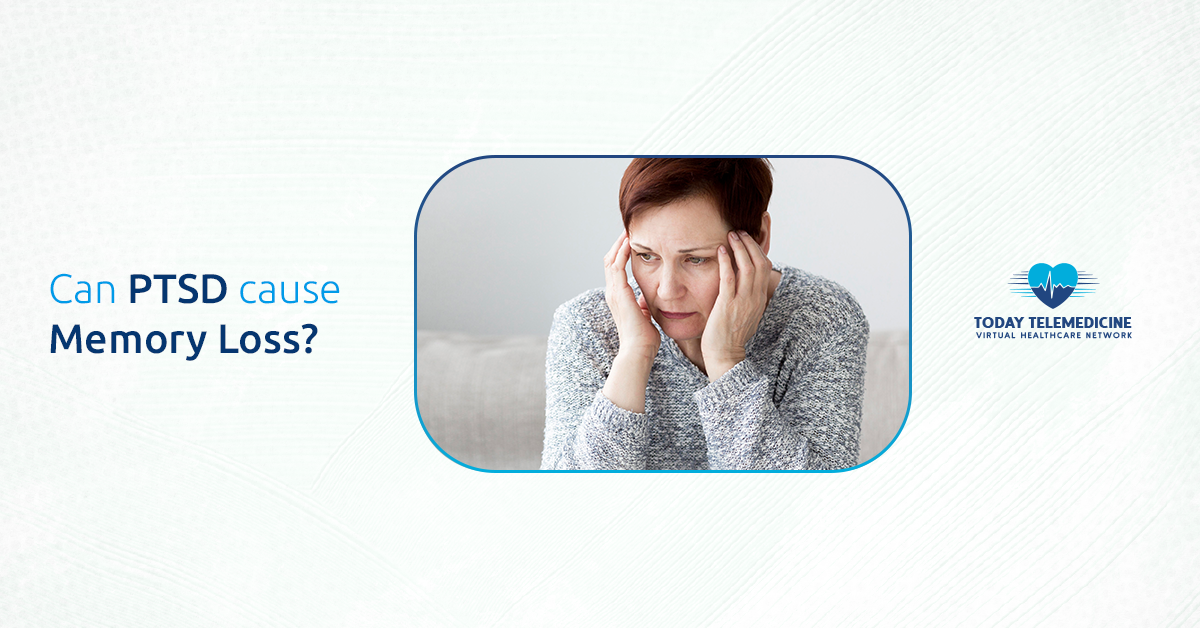People with Post-Traumatic Stress Disorder (PTSD) suffer from flashbacks, nightmares, and anxiety. However, memory loss, a minor-known symptom, significantly affects daily life.
PTSD, triggered by trauma, disrupts how individuals process and remember events. Thus, understanding PTSD is crucial. It changes one’s view of the past, present, and future.
Memory issues in PTSD impact overall well-being. So, recognizing these effects is vital for healing and support.
Get psychiatric care to meet your needs with Today Telemedicine. Book appointments any day, from anywhere. A board-certified psychiatrist will find the right medication and plan your treatment for PTSD memory loss.
What Is Post-Traumatic Stress Disorder?
To answer, “Can PTSD cause memory loss?” we first need to understand PTSD.
PTSD is a mental health condition. It arises from traumatic events, either a series or a single experience. This can include a natural disaster, a car accident, or terrorism. It also includes chronic trauma, like stress, bullying, or abuse (physical, emotional, or sexual).
To be diagnosed with PTSD, one must meet specific criteria. These include the symptoms listed below:
Intrusive Thoughts
- Thoughts of trauma keep coming back. Reminders trigger strong reactions. Flashbacks make one relive past horrors. Nightmares twist the event in sleep. These disruptions interfere with daily life. They keep survivors stuck in pain.
Physical/Emotional Changes
- Guilt and shame follow you constantly. You jump at small noises. Focusing is hard. Sleep evades you. Anger strikes suddenly. Your temper is shorter. These signs show deeper problems. Your mind and body are stressed. Noticing them is the first step to healing and finding peace.
Avoidance
- Traumatic memories hide in familiar faces and places. The mind blocks out past events. Details fade, creating gaps. We avoid reminders, hoping to lessen the pain. Yet, fragments still haunt us.
Mood changes
- Isolation sets in when we distance ourselves from loved ones. Hobbies we once loved lose their charm. A dull fog blankets our joy. Hope dims, becoming hard to reach. Positive feelings slip away. The world turns gray, losing its brightness.
PTSD affects the brain deeply. So, its symptoms can be severe and hard to cope with. The good news is, with the right therapy, those with PTSD can recover. They can cope with symptoms and their effects.
So, Can PTSD Cause Memory Loss?
A study closely examined the effects of PTSD on memory. It found that, yes, PTSD causes memory loss.
Memory disturbances are common in post-traumatic stress disorder (PTSD). They are part of the diagnostic criteria. PTSD has two symptom criteria for re-experience. They are intrusive memories of the traumatic event. The avoidance criteria include an inability to recall important aspects of the trauma. Also, PTSD patients often report memory problems with neutral material.
PTSD diagnosis relies on memory loss symptoms. Patients might forget non-trauma details. This selective amnesia, the key to the disorder, disrupts daily life. Clinicians identify these gaps to confirm PTSD and adjust treatment.
Those with poor memory are at higher risk for PTSD after a trauma.
PTSD alters brain chemistry, affecting stress and memory. It changes the hippocampus, prefrontal cortex, and amygdala. This leads to poor memory and cognitive function. These neural disruptions are key to PTSD, reshaping mental processes.
Why Does Trauma Cause Memory Loss?
Trauma can cause memory loss. It’s a coping mechanism. It shields a person from the intense feelings tied to the traumatic event.
The brain protects itself from trauma over time. Abuse and violence can trigger this. It hides emotional memories to safeguard us.
This defense often activates after prolonged stress. It’s an adaptation to survive such situations. This process helps the mind avoid reliving overwhelming emotions. Those emotions could interfere with daily life.
PTSD and Memory Loss Recovery
Memory loss is a tough symptom of PTSD, but recovery is achievable. Here are strategies for PTSD and memory loss recovery:
-
Trauma-Focused Therapy
EMDR and CBT therapies help heal trauma. They reduce memory gaps and lessen intrusive thoughts. These methods also boost recall and overall memory by reorganizing painful experiences. They offer hope to those burdened by past events.
-
Memory Rehab
Techniques to boost focus can help PTSD sufferers with memory loss. Mindfulness improves attention. Grounding exercises stabilize the mind. Neurofeedback optimizes brain function. These methods enhance cognitive skills, easing forgetfulness and improving brain health. With practice, short-term memory and concentration may improve, empowering those affected by trauma.
-
Medication
Doctors can prescribe antidepressants and anti-anxiety medications for PTSD. These drugs may improve memory. They help by reducing stress and anxiety.
-
Lifestyle Changes
Exercise, good nutrition, and rest boost brainpower. They may help with trauma-related memory issues. These habits improve brain function and aid in recovering from trauma-related memory loss.
Conclusion
Can PTSD cause memory loss?
PTSD disrupts memory, confusing the past and present. The brain, in pain, blocks out memories. It forgets both neutral and painful moments. This happens due to damage in the hippocampus and amygdala. Short-term memories vanish easily. Meanwhile, dissociative amnesia darkens the view of life.
Recovery is possible. The right strategies can help. They include trauma-focused therapies, memory rehab, medication, and lifestyle changes. Seek help from a pro to create a personalized plan.
FAQs
Can PTSD cause memory loss permanently?
PTSD-related memory loss is not always permanent. With appropriate treatment, individuals can often experience significant improvements. Recovery varies by trauma’s severity and duration. Each person’s healing is unique, influenced by their experiences and resilience.
Why do people with PTSD have trouble remembering events?
Trauma affects the brain’s memory areas. Stress increases, leading to more stress hormones. The hippocampus shrinks. PTSD changes brain connections, disrupting memory formation and storage. This leads to memory issues.
Is memory loss common with all forms of PTSD?
Memory loss can occur in all forms of PTSD, but the extent may vary. C-PTSD, from prolonged trauma, may harm memory more than PTSD from a single event.





